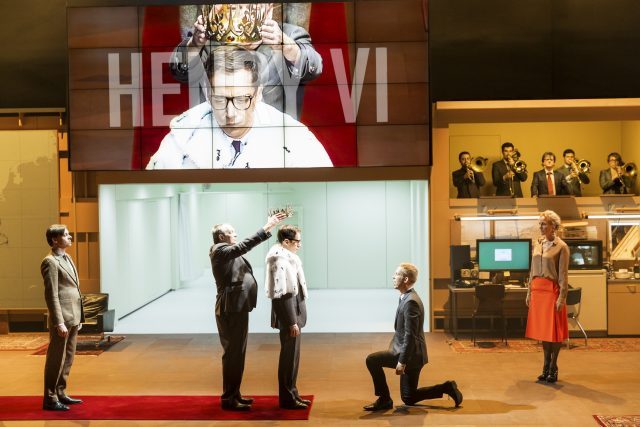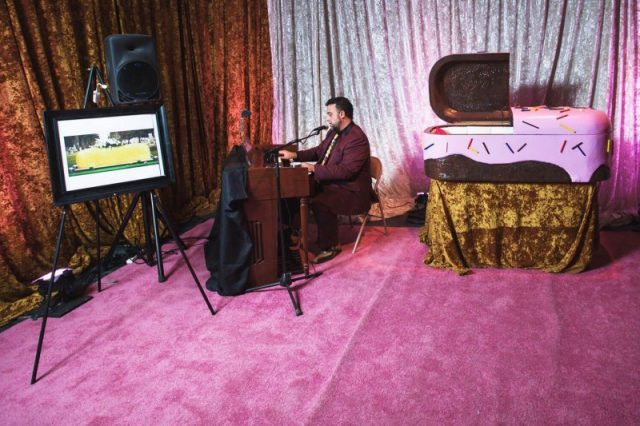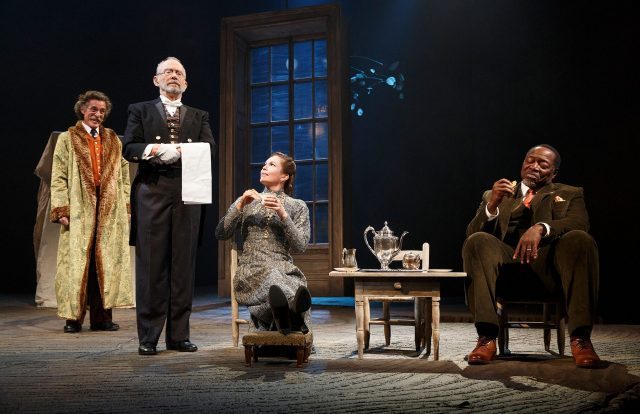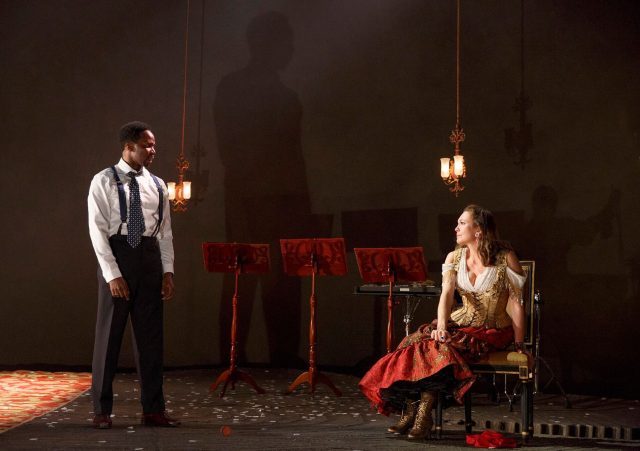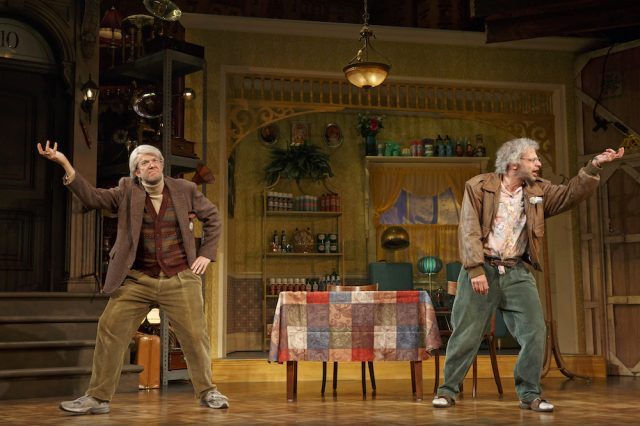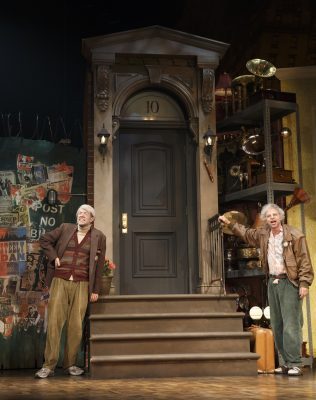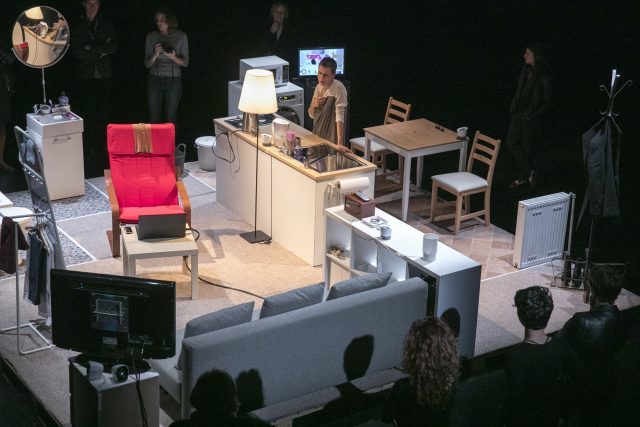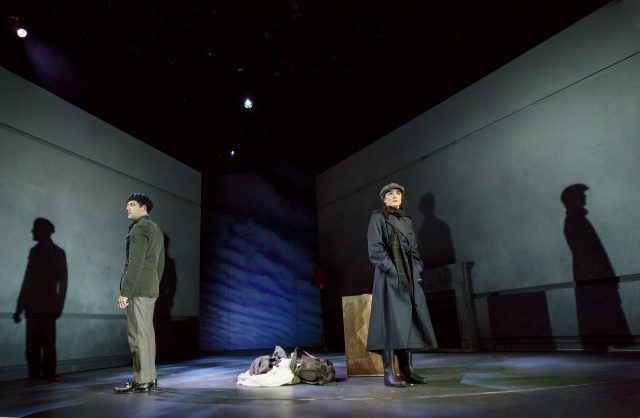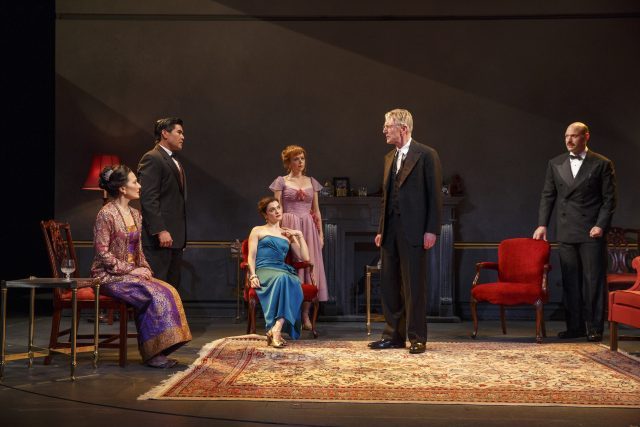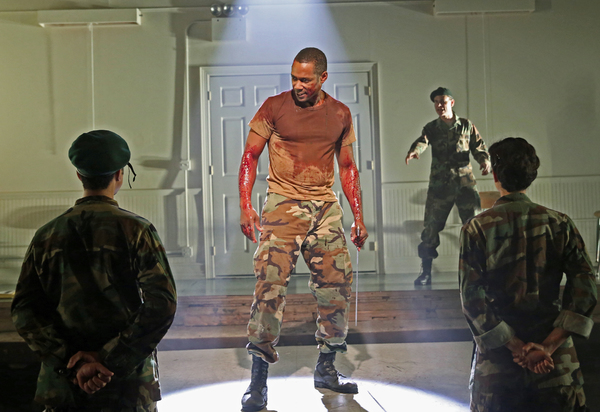
Dion Johnstone is fierce as Coriolanus in bloody Red Bull production (photo by Carol Rosegg)
Barrow Street Theatre
27 Barrow St. at Seventh Ave. South
Tuesday – Sunday through November 20, $80-$100
www.redbulltheater.com
barrowstreettheatre.com
Director Michael Sexton and Red Bull Theater transport one of William Shakespeare’s lesser-known, lesser-performed plays, Coriolanus, to up-to-the-minute contemporary times in a fast and furious immersive adaptation bursting with passion and energy. Set and lighting designer Brett J. Banakis has transformed the Barrow Street Theatre into the site of an Occupy movement in Rome, where hungry young citizens (Edward O’Blenis, Olivia Reis, and others) are protesting the government’s control of corn. “We are accounted poor citizens, the patricians good. What authority surfeits on would relieve us,” one citizen proclaims. “If they would yield us but the superfluity, we might guess they relieved us humanely. But they think we are too dear. The leanness that afflicts us is as an inventory to particularize their abundance. Our sufferance is as a gain to them. Let us revenge it with our pikes ere we become rakes; for the gods know I speak this in hunger for bread, not in thirst for revenge.” While patrician Menenius Agrippa (Patrick Page) understands their complaints, his good friend, Roman general Cauis Martius (Dion Johnstone), dismisses the Occupiers as “dissentious rogues” and “fragments.” Later, when Martius returns a hero in the battle against Corioles and his archenemy, Tullus Aufidius (Matthew Amendt), earning him the new name Coriolanus, the citizens, spurred on by manipulative tribunes Brutus (Merritt Janson) and Sicinius (Stephen Spinella), decide to do whatever they can to prevent him from becoming elected consul, taking up weapons and smashing ballot boxes. As Coriolanus’s pride and power grow, his mother, Volumnia (Lisa Harrow), his wife, Virgilia (Rebecca S’manga Frank), their son (Reis), and family friend Valeria (Christina Pumariega), a chaste lady of Rome, try to tone down the rhetoric and focus on his humanity, but there appears to be no stopping an inevitable, and bloody, conclusion.
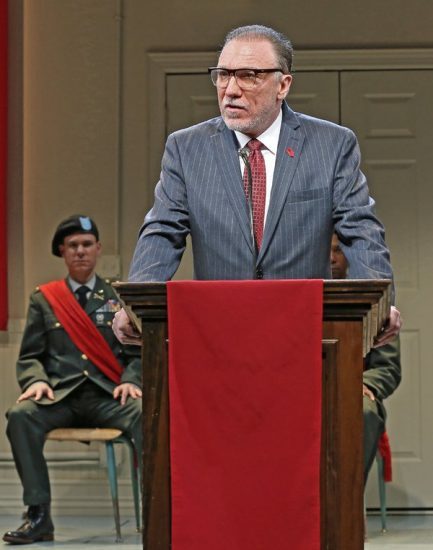
The exquisite Patrick Page is once again at his best as Menenius Agrippa in CORIOLANUS (photo by Carol Rosegg)
It might be Rome, 493 BCE, but it could just as easily be America, 2016, inside the Barrow Street Theatre. A platform juts out from the stage, with the audience sitting around three sides. The characters enter and leave by weaving through the aisles, often interacting with the crowd, shaking hands, giving them a balloon, or handing out ballots. The immersive structure helps cover up some of the play’s difficulties and deficiencies, particularly after Coriolanus is banished and considers joining up with Aufidius to take Rome forcefully. In his U.S. debut, Stratford Festival star Johnstone is fierce and aggressive in a challenging role that does not offer much subtlety; it is easier to get frustrated by Coriolanus’s choices than to get behind him as a heroic figure. Page (Casa Valentina, Spring Awakening), one of New York City’s finest and most natural stage actors, nearly steals the show as Menenius, his dialogue rolling eloquently off his tongue in a thrilling baritone that rattles through the theater; his Menenius is like a modern-day campaign manager unable to rein in his boss from certain self-destruction. Janson (TFANA’s Tamburlaine the Great, Notes from Underground) and two-time Tony winner Spinella (Angels in America, Red Bull’s Volpone) evoke a devious teaming of Nancy Pelosi and Mitch McConnell, taking dastardly delight as political puppeteers fomenting rebellion. Harrow (Wit, Last Days of Chez Nous) is divinely elegant as Coriolanus’s distressed though determined mother, while Aaron Krohn is strong and stalwart as Coriolanus’s devoted right-hand man, General Cominius; Zachary Fine is a hoot as Titus Lartius and several others; and Amendt plays Aufidius like he’s a wasted British rock star. And costume designer Ásta Bennie Hostetter has fun with the outfits, from bold military uniforms to dapper suits, from hoodies to an Occupier’s T-shirt that says, “There is no capitalism without racism.” Longtime character actor Dakin Matthews, who has appeared in such recent political plays as The Audience and All the Way and was formerly artistic director of the Berkeley Shakespeare Festival, serves as dramaturg, noting in the program that Coriolanus “must appear before the people in humble garb, displaying his wounds and getting their ‘voices’ (votes), and then have their election confirmed by the people’s tribunes, who are so opposed to his elevation that they conspire to deny it to him by manipulating the people’s affections,” which sounds eerily familiar given what is happening in the current presidential campaign. Sexton (Shakespeare’s Margaret for Red Bull, Titus Andronicus at the Public), artistic director of the Shakespeare Society, keeps things chaotically orderly and involving, although a drug-party scene goes a bit over the top even as it adds needed humor. Red Bull excels at reviving seventeenth- and eighteenth-century plays (Volpone, The School for Scandal, ’Tis Pity She’s a Whore), and Coriolanus is yet another triumph for this always inventive and extremely talented company.
